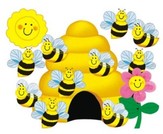
Just as the bees bring nectar from the flowers to the hive to create honey, the educators I have been with during the last 3 weeks will take their new knowledge and skills back to their own classrooms to make a difference in the learning of their students. But as we have learned in my Baker University curriculum course, new knowledge and skills do not necessarily translate into effective implementation. We have to plan with the end in mind - backwards design seems to work best - so that we provide clear goals, room for inquiry, a plan for assessment, and quality, focused learning experiences to effectively achieve the goal. But it doesn't matter what we are planning, whether it's our summer vacation, the holiday cookout, adding onto our church, or crafting legislative action, having a vision as to what the result will be must come first or we will unlikely have the end product that we desire! Bees are not random or hope to create honey. They are on a mission, know what the outcome will be, and DO create honey!
Being busy doesn't mean the goal will be achieved effectively either. Bees never seem to stop working, buzzing around their hive in a flurry of activity. Their work is purposeful. They aren't just buzzing to be buzzing. They are creating honey and each bee has a role to play in that process. Planning for learning, or any other significant endeavor, also requires careful planning, clearly stated expectations, and fulfillment of the roles and tasks needed to achieve the goal. When I go to the store each week, it is imperative that I have a list, otherwise I may not come home with the items I really need, or I end up buying things I didn't really need (or already have on hand). Purposeful planning sets up effective doing!
Which brings us to another lesson from the bees: one can accomplish a lot more when we work together. Rarely do you see a hive with only individual bees randomly flying around. More often than not, you see a thriving, buzzing group of bees busily working at their assigned task. As I listened and watched the participants in our workshops during the last 2 weeks, I saw a lot of buzzing as they discussed and collaborated to learn as much as possible so they could implement this new learning. Even as they were mulling over ideas, they were eager to share their new understandings with those in the class and take back to share with their colleagues. My husband and I would have never been able to remodel our house and transform it from a farm house to a log house without a collaborative working relationship. As I've noted in previous blogs - he has the ability to take our ideas and make them reality. Whenever we work together on a project, we utilize each other's strengths to spark ideas, reflect on and revise our plans, and ultimately get the job done. It is so much easier when we ask for help, or include others in our planning and implementation. Rarely do any of us have all the answers or all the tools needed to accomplish a task well!
Bees are persistent too. The new buzz word in education today is to develop grit. A lot of us lost that skill some time ago when technological advances made life much easier. But bees can be our inspiration as they continue to find sources of nectar, even if it's a dry year and the flowers aren't blooming like they usually do. They are focused on the end result and they continue to work until the job is done. In education, one way to practice and achieve the trait of "grit" is through project based learning. This involves so much more than just studying or doing research and then writing or answering questions about it. It involves real world (authentic) application of knowledge and skills to produce a project of value and one that demonstrates true understanding. It took us nearly 10 years to remodel our house and make the transformation complete. But persistence won out over limited funds and the temptation to take a break and never start up again. We started with the end in mind, and found ways to overcome the obstacles and achieve the desired result. Even today, we still tweak that final product to make it even better. But then that's another topic for another day!
And now I must get busy.... grading projects awaits!
 RSS Feed
RSS Feed